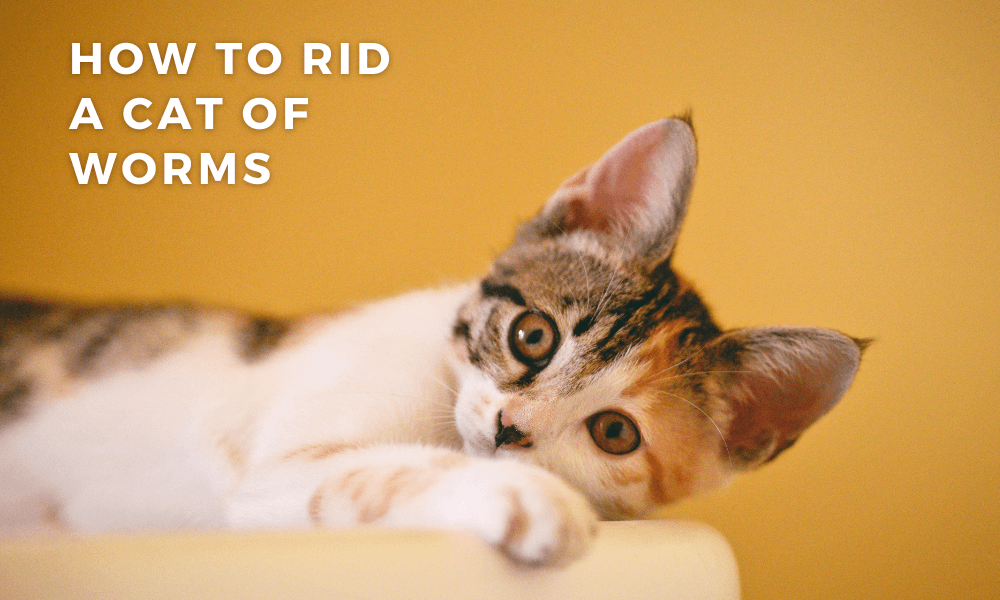"My cat has worms" - Just hearing that can bring a shudder to any loving pet owner; seeing the worms on your kitty's bed or in their poop is another thing altogether. For this reason many cat owners often worry that their cats – particularly if your frisky feline likes to play around outdoors – may be vulnerable to parasites and diseases. The other problem is that not all parasites show up in the same way. While this concern is completely reasonable, taking care of your fur babies is not as hard as you may think it is.

Caring for your pets can be easy if you know what to look for.
At the beginning stages your kitty may not always tell you there is a problem, but when you know the signs of cat worms to watch out for you can also figure out what parasites are infecting your feline. Then you can help your kitty to get rid of the nasty worms and also make sure they don't infect you or any other pets in your household.
In the unfortunate scenario that your pet does happen to get sick, knowing what to do helps bring them back to health much faster.
How do I know if my cat has worms?
The sad truth is that many cats get parasites and these pesky creatures don't discriminate between indoor and outdoor cats, kittens and older cats. Cats of any age and breed can get infected with worms. The first step to help a cat get rid of feline parasites, is knowing the signs to watch for.
Some signs, and this is typically the first things a cat owner will notice, is actual signs of worms - whether that is the whole worm or parts of a worm, or even just the worm eggs that show up in your cat's stool. If the cat is having trouble expelling the worm, or the worm eggs have migrated to the cat's anus, they may show up in the fur in the rear end.
Another somewhat obvious sign is that the abdomen is enlarged or distended - almost like the cat is pregnant.
Other symptoms that may not be an obvious sign of worms, but that can also signal that there are parasites in the cat's body include:
- Increased Vomiting: it is possible to even see worms in the vomit, but this is not always the case
- Diarrhea: any change in the regular bowl movement can be a sign of worms. A dark stool can also indicate blood in the intestines which may be a result of hookworms or whipworms
- Loss of Fur \ Dull Coat: the fur may start to appear dull or matted
- Skin Lesions and Itchiness: bumps, pustules, rashes, crusty skin or even ulcers can develop on the skin
- Weight loss or Weakness: the cat may lose their appetite and not want to eat or drink, or they may be eating but are still losing weight

Although feline worms can often be removed safely and quickly, if the condition is not treated right away other worse symptoms may start to show up, including: fever, pale gums, low blood pressure, anemia, pneumonia, and shock.
That is why it is important to watch for any of the early symptoms, and have your cat be treated for worms before the condition gets worse. It is best to check with your vet to find out for sure if the cause of your kitty not feeling well is in fact feline parasites. Once you determine that your sweet feline has worms, the next step is to determine what kind of parasites these are. Your vet can help with this as well.
Types of Cat Parasites
Parasites can come in through any medium; our shoes, open windows, even the soil for potted plants. Once they enter the house, your cat can be at risk – and as a result, you may be, too.
Knowing the types of common parasites that affect cats, their signs and their life cycles can help you make sure that you’re taking care of your furry friend and maintaining their health.
There are a number of parasites to look out for, but generally they can be divided into three classes:
intestinal parasites, feline heartworm, and ectoparasites.
Let’s take a look at some of the most commonly found parasites in cats.
Intestinal Parasites
Intestinal parasites are the most common types of worms found in cats – even indoor ones. If you’ve ever had a cat as a pet, you’ve probably heard of problems like roundworms or tapeworms. Because cats will usually be shedding the eggs rather than ‘worms’, you will probably not see the actual parasite itself. However, when infected, cats will have vomiting and diarrhea problems, along with bloody feces and a possible pot belly appearance.
These parasites can infect other pets, as well as humans, so it is best to get your cat screened at least four times as a kitten, and then twice a year as adults.
The most common types of feline intestinal parasites are roundworm, whipworm, hookworm and tapeworm and we explain a bit about each below.

Roundworms
Roundworms are the most common types of intestinal parasites found in cats and most cats will get them at least once in their lifetime. Roundworms are not a danger to adult cats but can cause serious illness or even death in kittens or senior cats. The worms can also pass from the mother to the kittens so the best way to prevent this from happening is to deworm the pregnant feline to make sure that nothing is passed on to the litter.
Adult roundworms look like long, thin spaghetti noodles that can be easily identified. To spot roundworms you can check the cat's stool or vomit as it is possible to see the actual worms swimming around there. The eggs of the roundworms can also show up in a cat's poop.
Tapeworm
Tapeworms are flat parasites that form in the cat's intestines when, as a flea, it inadvertently gets swallowed by the cat. One the flea is digested, the tapeworm egg is released, hatches, and attaches itself to the cat's intestines. If the tapeworm separates from the intestine wall, it can travel to the stomach, causing the cat to vomit. It may also irritate the anus causing the cat to scoot in order to ease the irritation.
Tapeworms are the type of worms in cats that look like small grains of white rice and can best be spotted in the cat's stool or on the cat bed. As tapeworms start out as fleas it is important to keep all pets away from fleas or the infection can recur even after being cleared.
Whipworm
The whipworm has a thick posterior and long, thin tail that resembles a whip, which is where the name “whipworm” is derived.
Whipworms can infect animals of any age and both dogs and cats can get infected by ingesting contaminated food, soil, water or feces. Although rare in North America, whipworms are still be problematic as they can stay in the the infected environment for up to 5 years and can also be passed from one animal to another.
As the symptoms include weight loss and digestive issues, these parasites pose serious health risks for kittens or older cats whole immune system is not as strong. Cats infected with whipworms may show signs of weight loss, digestive or intestinal issues, and bloody diarrhea.
Hookworm
Hookworms are small intestinal parasites that are not as easy to detect because they are not visible to the naked eye so it is important to watch your feline for other symptoms that may indicate an infestation.
The hookworm has hook-like teeth which they use to attach themselves to the lining of the cat's intestine. Similar to whipworms, cats can get hookworms by ingesting contaminated water or by coming into contact with other contaminated sources such as dirt and feces. The hookworm can even migrate into the body through the feet on an animal that is walking on infected soil or litter.
In addition, kittens can get hookworms passed to them directly from their mother.
Hookworms are the most harmful of the feline parasites because the worm tends to feed off the cat's intestines causing internal bleeding. Fortunately, this type of cat worm is less common than other types of parasites.
An even less common, but no less problematic parasite that can infect cats is Heartworm.
Heartworm
Heartworm is a much more concerning disease than other kinds of parasites because if they grow to adulthood they enter the heart and lungs. There are no effective treatment options for adult heartworm, and you definitely don’t want to reach this point. Heartworm can cause respiratory problems even in early stages so it’s important to make sure your cats remain safe.
Since mosquitos are the main carriers for heartworm, cats only get infected if they get bitten by a carrier mosquito. Mosquitos can easily enter the house so the risk for indoor cats is not much lower than for outdoor cats.

Heartworm can be easily confused with feline asthma, since it results in breathing troubles and coughing. It also manifests as a decreased appetite and intermittent vomiting. If you see any of these signs in your cat, you should rush them to the vet before it is too late.
Ectoparasites
Ectoparasites are those that live on the cat rather than inside. Among the fur, on the skin – that is where you’ll most likely find an ectoparasite.
Fleas
Fleas are the most common ectoparasites, and are probably the first kind that comes to mind when you think of parasites. Symptoms for fleas will usually involve scabby rashes and hair loss. Sometimes, cats will have no symptoms at all, which can be more dangerous because it can be harder to pinpoint that there is a flea problem.

On top of being parasites themselves, fleas can also transmit other diseases to the cat. Many cats with fleas also have a tapeworm problem, carried by the flea and ingested during grooming.
Outdoor cats are much more susceptible to flea problems. Fortunately, there are plenty of flea control treatments available and they are very effective if used in time.
Ticks
Besides fleas, ticks and lice are also very common. Ticks are more common on pets that spend a lot of time outside, but if brought into the house somehow, they can also affect indoor pets. Ticks are also carriers of other diseases that can affect all kinds of pets as well as humans. They suck on the host’s blood and take a few days to finish feeding.
Cats are less likely to have ticks since they are very fastidious groomers, but if you observe a tick on your cat, it’s best to get them to the vet to get checked out for any illnesses.
Symptoms caused by these many of these feline parasites can be similar to other kinds of health issues or diseases which is why getting your cat to the vet at the earliest sign of such symptoms can help you resolve the issue fast, without your cat’s health getting much worse.
How To Rid Your Cat of Worms
The best way to make sure your cat does not get worms is through prevention. Getting your cat checked regularly and deworming them is the best way to prevent them getting any intestinal worms. In addition, if you live in a hot and humid environment year round or even if it's just in the summer, a good flea and tick prevention program is critical for keeping these pests away from your fur baby.
This is especially important for cats that spend a lot of time outdoors and can get into all kinds of things. Preventative deworming, which can be done every 3 months, can help reduce the chance of your kitty picking up these nasty bugs and passing them on to other pets in the household.

As mentioned earlier, keep a watchful eye on your cat to detect any difference in their behavior, their appearance, or their health - all of which may be an early indication that there is a problem.
Monitor their litter box to see if you spot any worms in the feces and make sure to keep their environment clean, including not letting uneaten food stay out too long so that it does not get contaminated.
While you obviously can’t monitor everything your cat comes into contact with, you should at least focus on the areas where they spend most of their time.
Natural Ways to Deworm Your Cat
When looking for an effective cat dewormer you need to check if the worming solution is made for the type of parasite that your can has. Some prescription and over the counter cat wormers are specific to one type of parasite, while others cover a host of different worms.
In addition to the dewormers found in pet stores or those offered by traditional vets, it's important to know that there are a number of natural worming treatments, which people who are concerned about the side effects of traditional worming solutions, can use.
Some natural dewormers for cats include: Turmeric, Pumpkin seeds, Carrots, Chamomile, and Coconut Oil
- Turmeric: known for its anti-inflammatory properties, Turmeric also can help to remove worms and repair the effects of intestinal damage which help improve the cat's gut health
- Pumpkin Seeds: these seeds contain a powerful amino acid called cucurbitacin, which immobilizes the worms, allowing them to be easily removed from the intestine. The seeds can be given whole or crushed into powder and mixed into the cat food. Use a teaspoon of raw pumpkin seeds per 10 pounds of body weight
- Carrots: in addition to being a great source of vitamin A, coarsely chopped carrots can help to scrape mucus and parasites off the cat's intestinal wall, thereby helping to flush out the worms
- Chamomile: is used to help all kinds of digestive issues and has been shown to aid in preventing and eliminating both roundworms and whipworms. Experts recommend mixing at least 1/4 cup water with 1/4 tsp of chamomile and then using just 1 teaspoon of the brewed tea for every 10 lbs of body weight
- Coconut Oil: this natural oil has many benefits, one of which is that it can help get rid of tapeworm and other intestinal parasites. It is important not too use to much so start off slow and work up to 1 teaspoon of coconut oil for every 10 pounds of cat body weight per day.
If you are not sure of the kind of worms your cat has or you just want a natural broad spectrum preventative dewormer that can help protect against different types of intestinal parasites consider the BestLife4Pets Dewormer for Cats and Kittens

This natural wormer treatment is specially formulated using select plants and minerals to remove and prevent the infestation of most of types of worms. The remedy helps the cats own system to expel the parasite from its body.
The remedy also helps aid the cat's natural healing and recovery process to restore the intestine and improve gut health.
This remedy can be used safely for adult cats as well as kittens, and even on pregnant felines so that no parasites are passed from the mother's milk to the kittens.
The Last Word on Cat Parasites
Parasitic infections can be very troublesome, especially in cats.
As a pet parent you know your cat best and are usually the first to spot any issues. However, cats are very private animals and tend to keep their pains and issues to themselves, so you should watch your cat closely to diagnose any potential problem in time. If you see any of the symptoms or even spot some worms or other parasites, it is easy to get rid of the problem without your cat’s health getting any worse as long as the issue is dealt with quickly.
The only good thing about worms is that you can stay ahead of the game by taking the necessary steps to deworm your cats and kittens on a regular basis before they suffer getting worms. After all, it's easier to prevent worms, then to deal with a sick cat.



